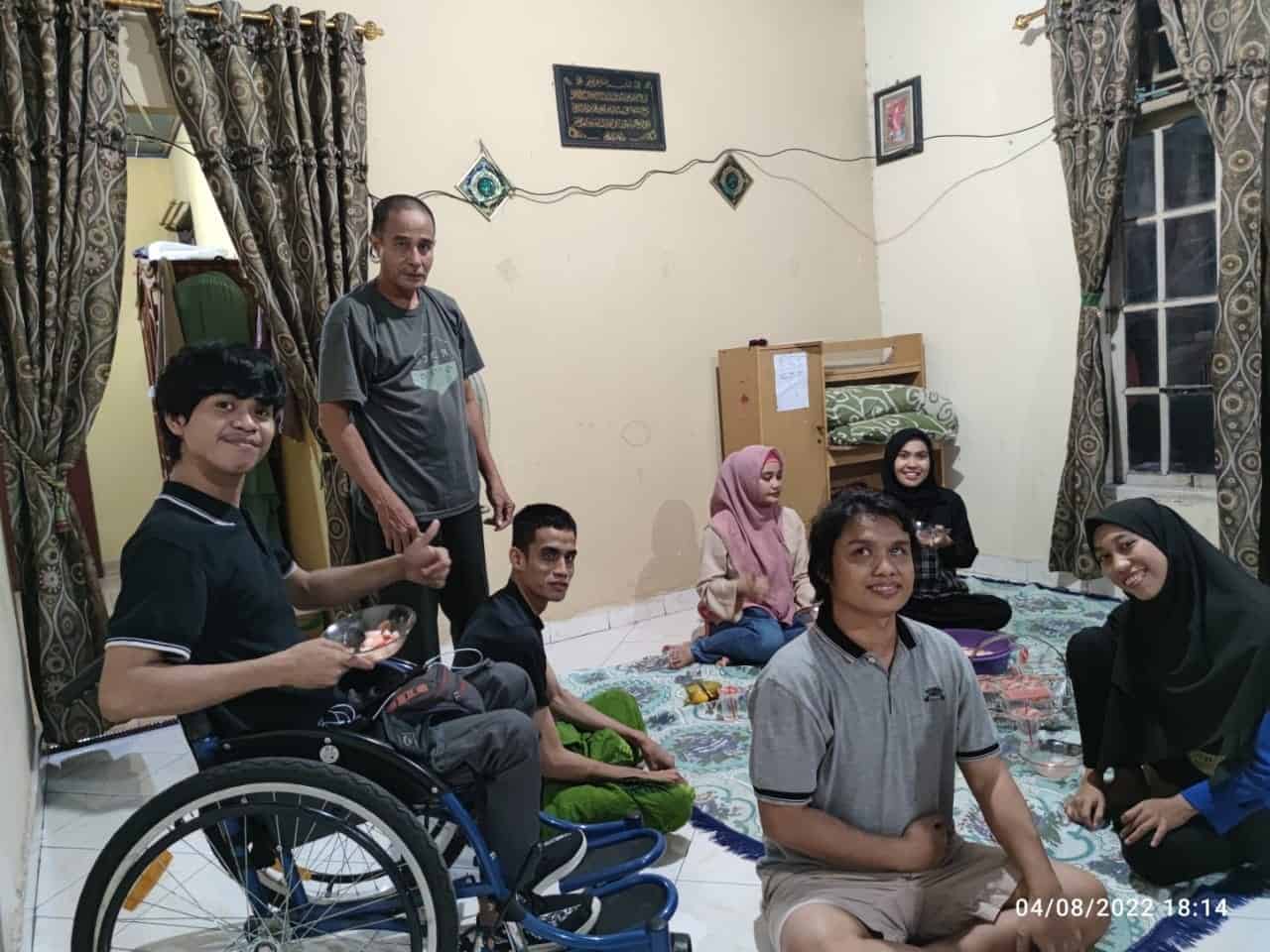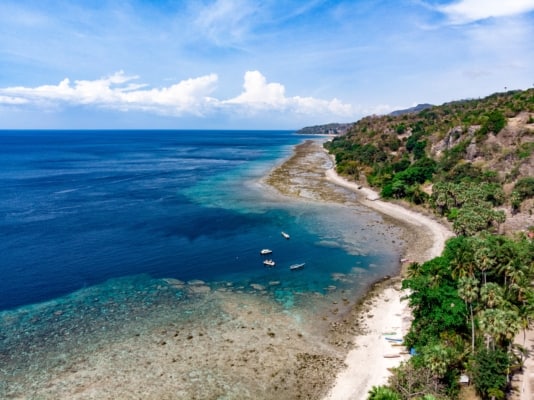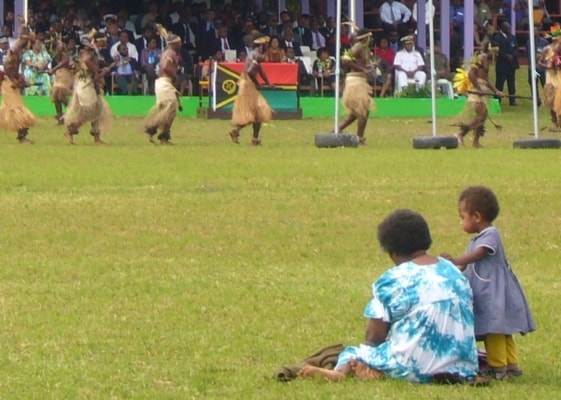Image: Syarif with other members of PerDIK’s board.
Nur Syarif Ramadhan is an emerging disability leader in Eastern Indonesia’s South Sulawesi province who has recently been elected as the Director of PerDIK, an Organisation of Persons with Disability based in Makassar. He is also a researcher on DLP’s Disability Leadership in Indonesia project. You can find out more about Syarif and his work here. Over the last 6 months, he has been interviewing disability leaders in South Sulawesi, West Sumatra and East Nusa Tenggara.
In this conversation with Elisabeth Jackson, he reflects on his own leadership journey and his involvement in the project. Many of his experiences reflect themes emerging in the research, including the importance of opportunities to develop leadership skills through involvement in disability organisations, mentors from within the disability movement who provide encouragement and advice, and a view of leadership as being about empowering others.
How did you get involved in disability activism?
When I moved to Makassar for high school, I met lots of disability activists who were involved in Pertuni, the Indonesian Blind Persons Association. At the time, Pertuni ran regular training courses in basic leadership for members who they felt had potential. Graduates of the training were often asked to help out with administration for Pertuni’s Regional Board, taking meeting notes and so on. So my first experience of being involved in a disability organisation was when I was around 15 years old.
I got involved with PerDIK about 6 months after it started. I read an article that Ishak Salim (PerDIK’s first Director and co-founder) wrote about making Makassar more accessible for persons with disability. I was really impressed with his take on this issue, and I thought I could learn something from him.
After I finished my undergraduate degree, I taught at a couple of schools for a year or so. But it wasn’t really my passion. Persons with disability still face so many challenges and there aren’t enough young people involved in disability activism. So I decided I wanted to focus on advocating and empowering persons with disability.
What experiences do you think shaped you as a leader?
I think my own experiences of having to advocate for myself – and helping others to do this – have been really important. The junior high school I went to was a special school. For senior high school, I applied to go to a regular public school, but I was rejected because of my disability. There were a couple of senior activists in Pertuni who were very supportive of me and helped me to advocate for myself.
The same thing happened when I applied to university. I had passed the entrance exam, but I hadn’t mentioned that I had a disability in my application form because students I knew who had declared a disability had been rejected. When I went to enrol on campus, they could tell that I had low vision. I was told that the course I had chosen (Civic Education and Communication) wasn’t appropriate for someone with a disability and that I should enrol in Special Education. There were 11 other students who were told the same thing, so I said to them, “Let’s appeal to the university”. We met with the Rector and told him that we had all passed the entrance exam and that we should be given a chance to prove that we could succeed in the courses we had chosen.
There was no reasonable accommodation made for any of us. I was lucky in that I had learned to use assistive technology while I was at high school. But it was really challenging for some of the other students. I set up an association for students who are blind or have low vision in 4 universities in Makassar so we could share knowledge and support each other.
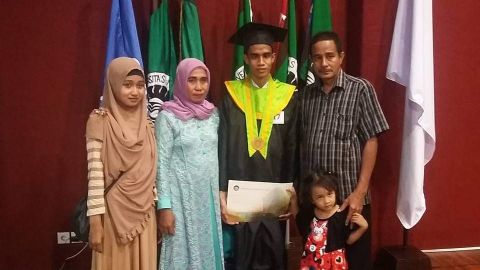
Syarif at his graduation, with his parents and younger sisters.
You’ve talked about supporting and empowering others. Can you tell me a bit more about what leadership means to you?
I think one of the most important things I can do as a leader is to share my knowledge and experience with others so that they can learn. I’ve been supporting PerDIK’s younger members to keep the student association alive, so they can help each other work through challenges and advocate for themselves. And it’s now broadened to students who are Deaf or hard of hearing.
Who do you think has supported or influenced you as a leader?
I’ve learned a lot from people like Ishak and senior activists like Joni Yulianto (co-founder and former Director of Yogyakarta-based disability rights organisation SIGAB). I’ve spent a lot of time chatting with Joni, getting his advice, learning how he does things. He’s very easy to talk to, and lots of younger activists go to him for advice.
In South Sulawesi, a senior activist, Hamzah M. Yamin, got me involved in Pertuni. He really motivated and mentored me and taught me how to advocate for myself.
What is something you’re proud of achieving?
In 2020, PerDIK was successful in lobbying the city government for a 5-year Disability Action Plan for Makassar. Makassar had issued a local regulation on disability inclusion in 2013 but had never developed a plan to put it into practice. In 2019, the new mayor had set up a committee to develop the plan, but they didn’t get anywhere. So the city government approached PerDIK. They saw what we’d been doing to support disability rights. We consulted with all the other disability organisations in Makassar in developing the plan, but for the technical aspects, it was just three of us from PerDIK, and an expert in budgeting from another organisation. Now there’s a plan, we need to make sure it gets implemented. The next step is to encourage the South Sulawesi provincial government to develop its own Disability Action Plan.
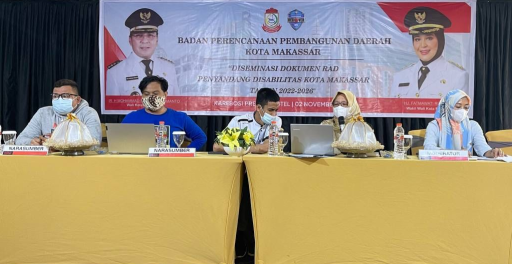
Syarif and other members of the team responsible for developing the 5-year Disability Action Plan for Makassar at the launch event. Picture by Badan Perencanaan Pembangunan Daerah Kota Makassar.
What have you learned from being involved in the project?
I’ve been able to meet with disability leaders from different regions and learn from them. The people I’ve interviewed have talked a lot about the challenges they’ve faced, but also how these challenges have helped them develop their leadership skills. That’s been really helpful for me, to understand that others have experienced the kinds of challenges I’m facing now and have worked through them. I’ve also developed my research skills and learned from others in the research team.
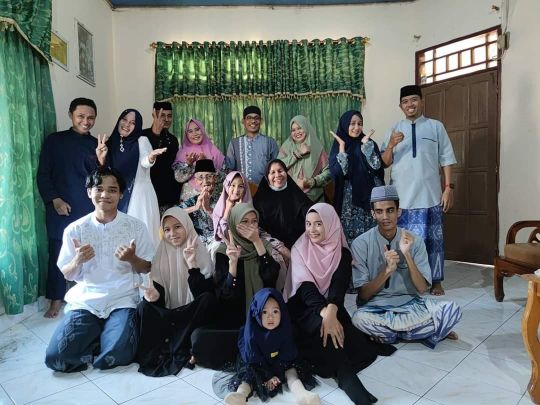
Syarif with his family.
Syarif spoke more about his life experiences and disability leadership at La Trobe University’s ‘Indonesia in Focus’ seminar, where he and Elisabeth Jackson also discuss their research for DLP’s disability leadership in Indonesia project. You can watch the video recording here.
Would you like to find out more about the interviews with Indonesian disability activists taking place as part of this project, and the fascinating stories involved? Check out our blog by Ishak Salim.

